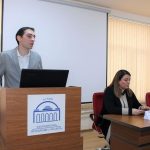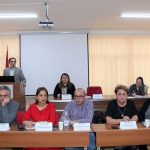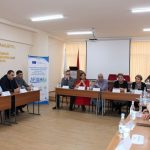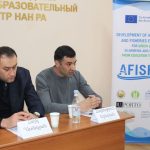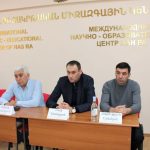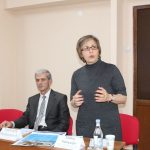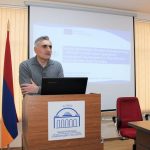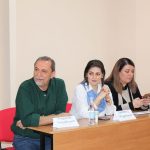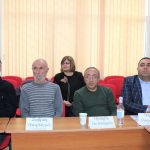16 Mar Meeting with Employers within the AFISHE Program
On March 16, a meeting of employers was held at ISEC at the invitation of the SCZH NAS RA within the framework of “Development of Aquaculture and Fisheries Education for Green Deal in Armenia and Ukraine: FROM EDUCATION TO ECOLOGY” (AFISHE) Erasmus+ CBHE jointly implemented by International Scientific-Educational Center of NAS RA, Armenian National Agrarian University and Scientific Center of Zoology and Hydroecology of NAS RA, aimed at identifying the needs and requirements of employers after international benchmarking experience in order to adapt the “Fish Farming” Master’s educational program in line with modern requirements.
The meeting was attended by the representatives of sectoral employers: the RA Ministry of Environment, “Arpi Lake”, “Sevan” and “Dilijan” National Parks, fish farming, as well as the International Scientific-Educational Center of NAS RA, Armenian National Agrarian University and the Scientific Center of Zoology and Hydroecology of NAS RA representatives, coordinator of the National Erasmus+ Office in Armenia, Lana Karlova.
Welcoming the participants, the Director of ISEC NAS RA, Armen Sargsyan emphasized the importance of active involvement of employers in the process of developing the educational program and including their suggestions in the curriculum.
The program coordinator Garegin Hambardzumyan briefly presented the main objectives of the program, and the coordinator of the Scientific Center of Zoology and Hydroecology of NAS RA, Bardukh Gabrielyan introduced the results of the international benchmarking carried out by the working teams of partner institutions, where the general conclusions and the best international practice of 30 master’s educational programs were derived.
During the discussion important recommendations were put forward by the employers, which should be included in the master’s program. In particular, it was noted that ichthyopathologists who are able to diagnose diseases of fish and other aquatic animals, prescribing correct and timely treatment, are most in demand today. In addition, there is a need in specialists who can organize the operation of fish farming, starting from the design phase, in compliance with international ecological requirements. It was also suggested to include courses in the master’s educational program that would help train hydrobiologists, fish breeders, ichthyologists, and also touched upon the development of a number of other significant abilities as necessary requirements for specialists. Some of the participants also suggested developing short-term training courses.
The meeting with the employers was very effective, considering that the above proposals will serve as the basis for the development of “Aquaculture and Fisheries” master’s educational program in line with the needs of business and modern society, as well as the opportunities for further university-enterprise-research cooperation will be expanded.

